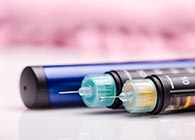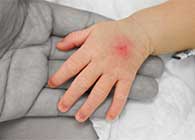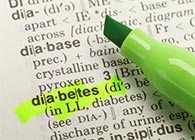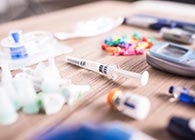Polycystic Ovarian Syndrome
Related Health Issues
Hypoglycaemia
The Eyes and Diabetes
The Kidneys and Diabetes
Weight and Diet
Exercise Your Heart
Diabetic Neuropathy
Diabetes and Coeliac Disease
Stress, Anxiety and Depression
The Prostate and Diabetes
Polycystic Ovarian Syndrome
Joint and Muscle Problems Associated With Diabetes
Impotence
Women, Sex and Diabetes
Osteoporosis – Is There A Link with Diabetes?
An experience of the menopause
![]()
Polycystic Ovarian Syndrome
What is polycystic ovarian syndrome?
Polycystic ovarian syndrome, or PCOS, is a hormonal disorder affecting 5% to 10% of women of childbearing age. There are higher than normal male hormones, called androgens in the bloodstream and fluid-filled cysts inside one or both of the ovaries which can produce unpleasant symptoms. Usually 15 to 20 follicles inside of the ovaries begin to mature for ovulation every month and one follicle matures and is released by the ovaries while the rest die off but women with PCOS never have one follicle mature fully. This results in the 15 to 20 follicles staying inside the ovaries and they become cysts and it is these cysts that produce androgens.
PCOS can greatly interrupt the menstrual cycle, causing irregular or even a complete lack of ovulation and so women with PCOS often have difficulties becoming pregnant.
Symptoms
Many women never have any symptoms but others have a wide variety of them including:
- irregular menstruation or loss of menstruation [amenorrhea].
- Difficulty getting pregnant.
- Weight gain, particularly around the waist line.
- Hirstism which causes excessive hair growth, especially on the face and body.
- Acne and oily skin.
- Decreased breast size.
Who is at risk of PCOS?
Any woman can develop PCOS but it does seem that some women are at an increased risk:
- having a family history of PCOS [especially mother or sister]
- having diabetes or insulin resistance
- being overweight or obese
- being between the ages of 20 and 30
What causes PCOS?
Researchers are unsure about the causes but there are some factors that seem to play a role:
- Low levels of follicle-stimulating hormone [FHS] which is hormone released by the pituitary gland. It helps follicles inside of the ovaries to mature so that ovulation can take place.
- High levels of androgens, male sex hormones – most women suffering from polycystic ovarian syndrome have extremely high levels of androgens which could interfere with ovulation and contribute to PCOS.
- Insulin resistance – A large number of women with PCOS are insulin resistant which means that the body does not manage insulin properly. Insulin is essential to proper ovarian function so resistance to insulin may contribute to PCOS. This seems a little complicated because PCOS itself can cause weight gain and weight gain can cause insulin resistance but it seems that insulin resistance can also play a part in the development of PCOS.
The connection with diabetes
In recent years, it has become clear that PCOS is closely related to a problem with insulin. However, experts have been unable to find out whether insulin is the cause of PCOS in some women or if PCOS leads to problems with insulin. But it is certain that women with PCOS often have problems with insulin resistance and one study found that as many as 30% of PCOS patients suffer from insulin resistance.
Treatment of PCOS
At present there is no cure for PCOS but there some treatments that can help regulate the menstrual cycle or increase the chances of getting pregnant. These include:
Weight loss – To regulate insulin levels and restore ovulation and menstruation.
Birth Control Pills – They contain both oestrogen and progesterone which can help to regulate the menstrual cycle and decrease the appearance of hair growth and acne.
Diabetes Medications – It has been thought that metformin, a Type 2 diabetes medication may be useful to decrease testosterone levels, restore ovulation and lessen hair growth but a recent study described below suggests otherwise.
Fertility medications – The fertility medication, Clomiphene or injections of gonadotropins may help to stimulate ovulation and increase your chances of getting pregnant.
Surgery – Ovarian drilling can be an effective procedure to help to stimulate ovulation. Small holes are punctured through the ovaries to allow a decrease in testosterone levels and an increase in ovulation.
Complications of PCOS
There are a number of health problems that can develop as a result of PCOS including infertility, thickening of the endometrium and obesity related illnesses such as heart disease and Type 2 diabetes.
PCOS can also have a significant emotional effect on women because of the changes in appearance and many women can feel isolated, and depressed.
Recent research
A large study [New England Journal of Medicine, Feb 8 2007] compared the effects of metformin and standard fertility treatment drug, clomiphene in helping women with PCOS to have a successful pregnancy.
According to the study, women who took metformin alone, ovulated more than women on standard treatment. Women taking a combination of metformin and clomiphene also ovulated more frequently than women taking clomiphene alone or metformin alone. However, the increase in ovulation did not result in an increase in the number of successful pregnancies and deliveries for with either metformin alone or the combination of metformin and clomiphene. The results were as follows:
- Metformin only group, 15 out of 208 women gave birth – 7.2%
- Clomiphene only group, 47 out of 209 women gave birth – 22.5 percent
- Combined clomiphene-metformin group, 56 out of 209 women gave birth – 26.8% and not a statistically significant difference from the clomiphene only group
- Obese women were less likely to conceive and less likely to ovulate in response to metformin.
- So the researchers recommend the use of clomiphene alone and not in combination with metformin.
![]()
For more information on polycystic ovarian syndrome, please visit the NHS Choices website:




































